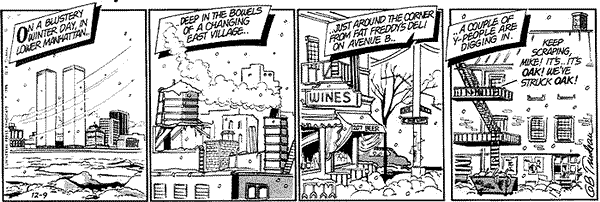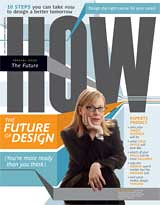Pretty Stupid

December 9th, 1985, Doonesbury comic strip by Gary Trudeau
There ain’t no reason things are this way, it’s how they always been and they intend to stay, I can’t explain why we live this way, we do it every day, sings Brett Dennen on his most recent CD, 'So Much More.' I have been listening to this song repeatedly of late, not exactly sure why but not exactly sure why not. All I do know, really, is that I agree with him when he states there’s no reason things are this way, I don’t know why I say the things I say, but I say them anyway.
I think it is fair to say that I talk for a living. Whether it is on the radio, in meetings with clients presenting design, or in school teaching the business of design, I find myself in a state of perpetual vocal motion, espousing one thought, then another, expressing beliefs, philosophies, sometimes even half-baked ideas. All of this is meant to provide a service, or to entertain, or to educate, or simply to share, but lately I have been reconsidering both the awesome privilege and responsibility inherent in public communication and the intrinsic accountability that accompanies it. I have been looking at both the purveyors and the methodologies of professional communicators in our culture: there are the politicians, of course, and news broadcasters and news magazine hosts, newspaper and magazine writers, designers and editors, and religious evangelists and businessmen and salesmen and lawyers and painters and rock stars. We all come to our microphones with mixed, sordid messages and in the hope that someone is listening. What is the point of all of these words? These diatribes, this opinionating, the propaganda—they are now inscribes with an impression of our humanity.
I admit it: magazines have massively influenced me for as long as I can remember. My love affair with the glossy periodical began with two of the best: Weekly Reader and Highlights. Issue after issue, I poured over every word, admiring and analyzing the illustrations, participating in the prescribed activities while imagining a life that could be as interesting and easy and organized as the lives in my treasured publications. My fantasy-laden journey continued on with the classic Teen tomes. Tiger Beat and Sixteen became my bibles as I gave my heart away to David Cassidy and Bobby Sherman and persuaded my perplexed parents to let me plaster my bedroom with life size posters of Marcia Brady and Laurie Partridge.
This mass consumption of information changed the way I related, perceived and lived. These messages, by changing the culture in which I participated, evoked a unique composition of sensory perceptions. The extension of any one of these perceptions altered the way I thought and acted. And like passing seasons or a transient fashion trend or any typical transitional object, when these perceptions changed, I changed too. Sometimes for the better, sometimes not, but either way it was based on someone else’s idea of what was groovy or pretty or neat, and whatever that was, I deeply needed to own and embody a piece of it.
This impressionability continued and flourished well into my twenties, long after I moved to Manhattan and tried on the idea of an adult life. Predictably, my new handbook became New York Magazine. With its weekly delivery, my daily existence became an exercise in reinvention. First, I wanted to be a part of the Brat Pack, then to write like Mary Ann Madden or Judith Crist. But in the mid ‘80s, a cover commandeered the newsstands with such a force, it nearly knocked me over. It was Gary Trudeau’s comic illustration of a Doonesbury character yearning to be a "yuppie"—a young urban professional. I was mesmerized. I wanted to be part of this chic and fashionable new movement badly: I wanted to be successful and professional and urbane. Despite its now dubious demarcation, back then (to me), yuppie-ness stood for self-sufficiency and security and stability and bravado. But yuppie-ness seemed so far out of my reach that I even badgered my then therapist for tips on how could I become one. My yearning raged on. Several weeks later, while riding the subway, I observed a young woman reading the now epic issue of the magazine. Sitting across from this perky young commanding executive, I longingly lamented this distant state of grace, all the while utterly entranced by the cover art. I imagined sitting side by side with Gary Trudeau. His wife, Jane Pauley, would be there too, donning khaki trousers, all the while indulging in quiche and cappuccinos. Then, smack in the middle of my fantasy, I realized the elderly man sitting next to the perky executive was staring at me. I quickly averted my eyes from the magazine and quizzically glanced back at the man. Without saying a word, he smiled sweetly, a hint of amusement in his eyes, and he shook his head. Then he discretely mouthed two words: NOT PRETTY. I raised my eyebrows but I couldn’t help but smile back.
Though much of what we read and participate in now is explicit enough to amuse, focus, stimulate or infuriate us, we hardly notice that in so doing, it continually reorganizes us. The media now has more impact on our culture than any other. One person’s quest for yuppie-dom might be someone else’s crusade for the immortality and retribution of Dylan Klebold, if Seung Cho is any example.
Last week, I left my office particularly late, but decided to walk home anyway. The streets were crowed with despondent hockey fans, as the Rangers had just lost the last game of their playoff season. As I navigated the crowds around Madison Square Garden, I chided myself for taking that particular route and decided to put my iPod on to block some of the raucous hooting and hollering. As I searched through the minefield that is my handbag, I kept walking and inadvertently collided into an irate Ranger fan. I quickly and profusely apologized, iPod now in hand. But my victim would hear nothing of it. He looked me straight in the eye and angrily told me to watch where I was walking. And then he cursed at me. I paused for a moment, considering a retort, but decided to keep walking. Unsatisfied with my reaction, he tried another tactic: name-calling. As he shouted out to my back, I couldn’t believe what I was hearing; he yelled: STUPID YUPPIE. At that moment I didn’t know if I should run for cover, or turn around, smile and thank him.


















0 Comments:
Post a Comment
<< Home